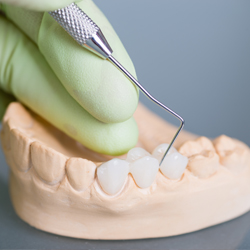
Beautiful Dental Sagamore Hills Crowns and Bridges
 Dental crowns and bridges are popular restorative procedures for
patients who have broken or severely decayed teeth, or for those who have lost teeth altogether. These procedures
are performed with expertise and efficiency at Greenwood Dental. Keep reading to learn more about bridges and dental
crowns in Sagamore Hills -- and how Dr. Greenwood can rescue your smile!
Dental crowns and bridges are popular restorative procedures for
patients who have broken or severely decayed teeth, or for those who have lost teeth altogether. These procedures
are performed with expertise and efficiency at Greenwood Dental. Keep reading to learn more about bridges and dental
crowns in Sagamore Hills -- and how Dr. Greenwood can rescue your smile!
What Is a Dental Crown?
A dental crown is a restoration that is affixed on top of a broken or damaged tooth. It is custom built according to the specific dimensions of your dentition -- and, when securely bonded around the tooth, a dental crown can last for many years.
A dental crown may be recommended for the following cases:
- To fix a broken tooth
- To restore tooth decay when there is not enough room for a filling
- To bring back the strength of a weak or worn tooth
- To enhance the appearance of a front tooth that looks pointy or too short
- To replace a tooth, when a dental implant is placed first
A dental crown can be made of several materials, including porcelain, gold, or metal alloys. The one that is right for you depends on the location of the crown, your budget, and your personal preference.
What Is a Dental Bridge?

While a dental crown brings back the form and function of a damaged tooth, the dental bridge replaces one or more consecutive teeth that have gone missing completely. After placement, a fixed traditional bridge cannot be removed except by your dentist. It is held in the smile with two dental crowns placed on each of the teeth surrounding the gap. Prosthetic teeth (pontics) are attached to the crowns to fill in the space between.
Most dental bridges are made of porcelain fused-to-metal, for a sturdy solution with an almost completely natural appearance.
How Are Crowns and Bridges Placed?
To place a crown or bridge, your will need to plan on making about two visits to our office. During the first, we will prepare an individual tooth to receive the crown, or prepare the supportive teeth to receive crowns for a bridge. Impressions are made and the treatment plan is compiled. This information is then sent to the lab, where your crown or bridge is created by an expert. A temporary crown will cover up the prepared tooth/teeth in the time between. When you return to our office, the temporary is removed and the permanent restoration is placed.
How Can I Maintain a Dental Crown or Bridge?
A dental crown or bridge can last for years and years -- possibly decades -- with proper care. To ensure that yours stays sturdy and strong for as long as possible, maintain excellent dental hygiene and continue with regular visits to your dentist. When you brush and floss, make sure to concentrate on the base of the restoration, as plaque and food particles can build up here.
Learn Even More Today!

Are you in need of a dental crown or bridge? If so, Dr. Dan Greenwood at Greenwood Dental is here to help! We invite you to contact us to learn more about crowns and bridges in Sagamore Hills.

Dental Crown FAQs
If you have a damaged or decayed tooth, Dr. Greenwood may recommend getting a dental crown in Sagamore Hills. The custom-made restoration is designed to restore your oral health while simultaneously enhancing your appearance. While you may already know about the benefits of a dental crown, it’s completely normal to have a few concerns before committing to anything. Below, we’ve decided to answer some of the most common questions we get from patients. If you don’t see what you’re looking for, feel free to reach out to our friendly team!
Are Dental Crowns Permanent?
Short answer: no, dental crowns are not considered permanent. However, they are a long-term solution for repairing damaged or decayed teeth. Most patients can expect their restoration to protect their teeth for anywhere from five to 15 years. Of course, it’s important to note that the process of getting a dental crown is irreversible. Dr. Greenwood will need to remove a thin layer of enamel in preparation for the restoration. Once it’s removed, it will never grow back, meaning the tooth will always need a crown for protection moving forward. You can help your crown stay in optimal condition for years to come by practicing good oral hygiene, visiting your dentist regularly, and following a healthy lifestyle.
After examining your mouth and learning more about your situation, your denture dentist in Belchertown will create a personalized treatment plan and provide you with an estimate. You’ll know exactly what you'll have to pay before committing to anything, so you won’t be surprised by any fees.
Are Implant Dentures More Expensive?
It's true, implant dentures can cost more than traditional methods, but they can be the most affordable long-term. Conventional dentures last for 5 to 7 years before needing to be replaced, but dental implants can last for decades. Not to mention, dental implants improve your oral health, so you'll save money later by avoiding costly treatments. Although you may pay more upfront, you'll benefit from a nearly perfect replica of your real teeth that can last for a lifetime. You have several solutions to keep dental implants affordable, like using your dental insurance or third-party financing.
How Do You Know When a Dental Crown Needs to Be Replaced?
Only a dentist can confirm whether or not your crown needs to be replaced. They’ll physically examine it and take X-rays to figure out what condition it’s in. Keep an eye out for the following signs as they can indicate your crown is approaching the end of its lifespan:
- Pain – If the underlying tooth is decayed, the crown will need to be removed to treat the cavity. Dr. Greenwood will assess the restoration and determine whether or not it should be replaced.
- Instability – Contact our office right away if your crown feels loose, particularly when chewing something sticky.
- Damage – A chipped or discolored appearance can negatively affect your self-confidence, which is reason enough to replace it.
- Dark Line at Crown’s Base – The porcelain layer may wear away with porcelain-fused-to-metal crowns, which can reveal the darker metal portion. It means the restoration may need to be replaced in the near future.
Do Dental Crowns Get Cavities?
While it’s impossible for a dental crown itself to develop cavities, the underlying tooth is still at risk. Believe it or not, a crowned tooth has about the same risk of decay as an uncrowned tooth. Luckily, there are many steps you can take to prevent cavities. Practicing good oral hygiene will make it difficult for bacteria and plaque to accumulate around the gum line where the tooth meets the restoration. Some other ways to protect your smile are by visiting your dentist regularly and maintaining a healthy diet.
Does It Hurt to Get a Dental Crown?
Before your procedure, Dr. Greenwood will numb the tooth that’ll be worked on to ensure you’re completely comfortable. Most people just need a topical anesthetic. However, severely anxious patients may benefit from dental sedation. Keep in mind that your tooth is typically numbed for the preparation phase, but not always for the final crown placement. Your teeth will likely feel sensitive for the next few days following your procedure. Taking over-the-counter pain medication and rinsing with lukewarm water can help ease your discomfort.